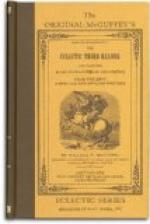Guanaxuato (gwa na hwa’to) Aube (ob)
Poughkeepsie (po kip’si) Caen (kon)
Worcester (woos’ter) Dieppe (dyep)
Youghiogheny (yoh’ho ga’ni) Foix
(fwa)
Newfoundland (nu’fund land) Joux (zhoo)
Chuquisaca (choo ke sa’ka) Lisle (lel)
Guatemala (ga te ma’la) Moux (moo)
Winnipiseogee (-pis sok’ki) Oude (owd)
Venezuela (ven e zwe’la) Sioux (soo)
Altamaha (al ta ma ha’) Thau (to)
Chautauqua (sha ta’kwa) Y (i)
Lesson 248.
Of characters used in punctuation.
A Comma [, ] denotes the slightest degree of separation between the elements of a sentence.
A Semicolon [; ] denotes a degree of separation somewhat greater than that indicated by a comma.
A Colon [:] marks a still greater degree of separation than a semicolon.
A Period [.] usually indicates the close of a sentence.
The Interrogation Point [?] is used at the end of a question.
The Exclamation Point [!] denotes astonishment or other emotion.
A Hyphen [ — ] is used to join words or syllables.
A Dash [-] marks a sudden break or stop in a sentence.
A Parenthesis [( )] includes words which might be left out without injuring the sense.
Brackets [ ] inclose words, etc., intended to explain or rectify what precedes or follows.
An Apostrophe [’] indicates the omission of one or more letters; or denotes the possessive case.
Quotation Marks [” “] show that the passage included, is taken from some other author.
OF CAPITAL LETTERS.
A Capital should begin: (1) the first word of every sentence, and of every line of poetry; (2) proper names of persons, places, months, and days; (3) all appellations of the Deity; (4) titles of honor; (5) names of things personified; (6) names denoting the race or nation of individuals; (7) adjectives derived from proper names; (8) the first word of a direct quotation or speech; (9) the principal words in the titles of books; (10) words denoting important events, the chief subject of a composition, etc. (11) The pronoun I and the interjection O are always capitals.



